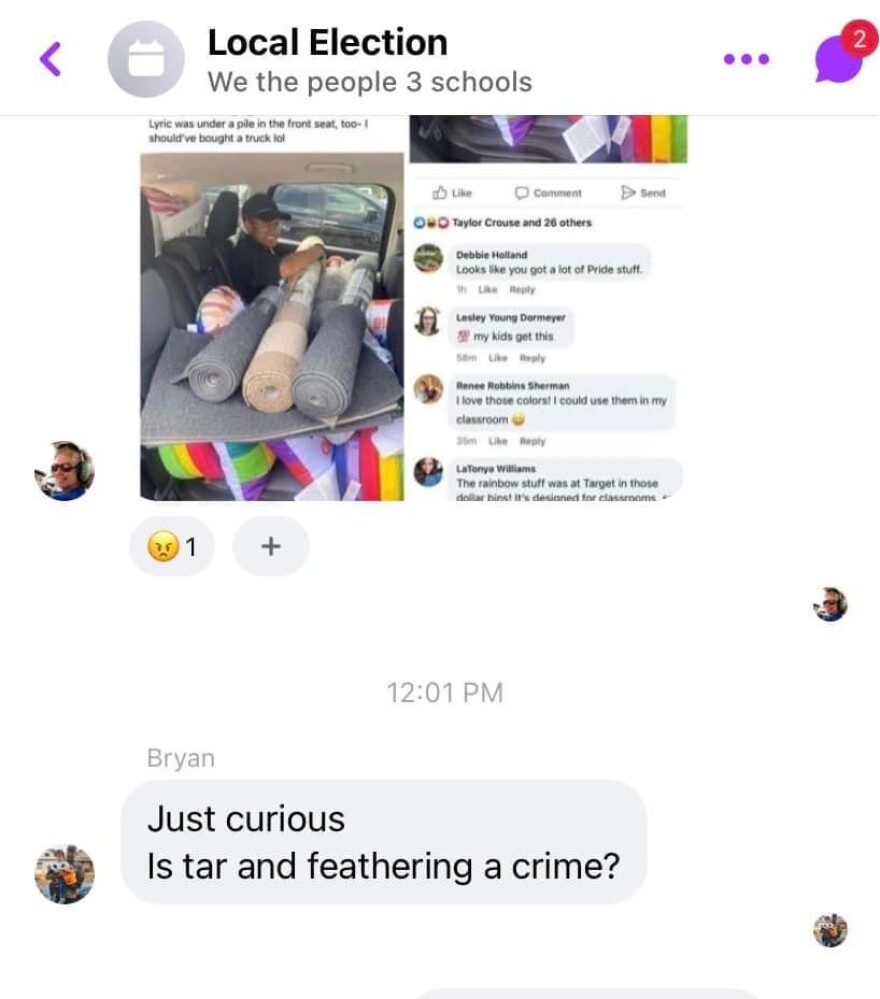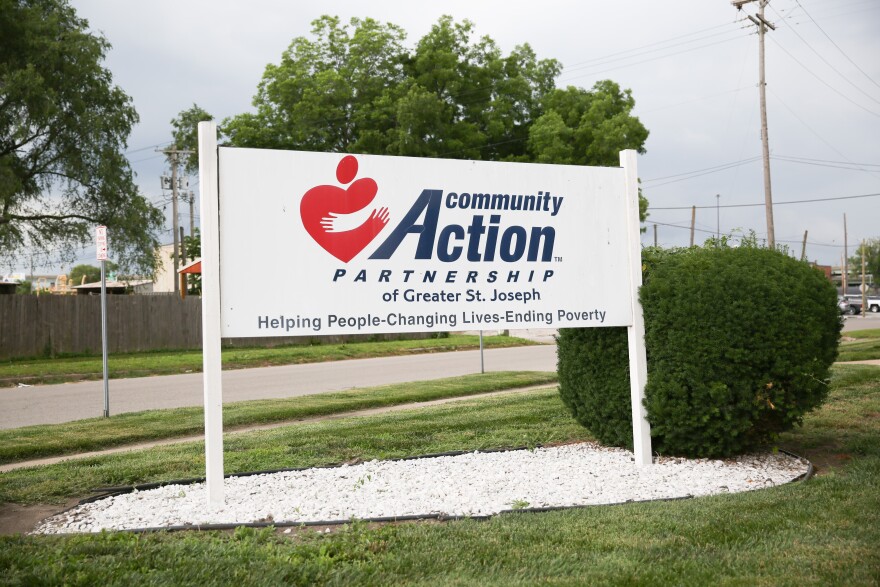In July 2023, LaTonya Williams, volunteer president of the school board in St. Joseph, Missouri, posted photos on her personal Facebook page of recent purchases from Target.
Among them were rainbow pillows and other colorful items she found in the dollar bin, intended for use at the Bartlett Center, a nonprofit providing child care and other social services where Williams works as executive director.
What seemed to be an innocuous post quickly became controversial among Facebook users in St. Joseph, a city of about 71,000 people an hour north of Kansas City. Some viewed it as a sign that Williams wanted to promote LGBTQ+ issues to children.
“This is the SJSD president showing exactly what she wants with the indoctrination of your children,” posted Kim Dragoo, a former school board candidate who was convicted of parading, demonstrating or picketing during the Jan. 6 U.S. Capitol insurrection. Dragoo was pardoned by President Donald Trump in January.

In a chat for the Facebook group “We the people 3 schools,” a user going by the name “Bryan” responded to Williams’ post, saying, “Just curious: Is tar and feathering a crime?”
It’s not unusual for issues in the St. Joseph school district to inspire passionate debate. A plan to consolidate the district’s three high schools into two has drawn criticism from the vocal “We the people 3 schools” group, led by Dragoo.
Last year, the community joined many others across the U.S. in debating whether students should have access to certain books with mature, LGBTQ+ and anti-racist content.
But since 2023, Williams and her fellow school board member, Whitney Lanning, said, the discourse has risen to the level of what they feel is harassment. And they believe it’s been instigated by the Stanley M. Herzog Charitable Foundation, a multimillion-dollar organization based in Smithville, Missouri, with the goal of promoting Christian education in public schools.
The foundation, which denies the accusation of harassment, has deep ties to St. Joseph, where its eponymous founder made his fortune in transportation and construction.
Articles published in The Lion, a Herzog-run website, accused Williams, Lanning and the school district of violating Missouri law — accusations that were later repeated in an investigation by the state attorney general’s office.
Missouri lawmakers tried to remove funding for Lanning’s then-employer, social services organization the Community Action Partnership of Greater St. Joseph, from the state budget. Lanning believes she was fired due to that controversy.
And people on Facebook have plotted to remove Williams and Lanning from the board, repeating talking points from Lion articles and frequently scrutinizing the women’s appearances and mannerisms.

Lanning and Williams said it’s an organized campaign to intimidate them because of their political beliefs. The two board members support LGBTQ+ rights and oppose book bans. They oppose spending public school funding on private or religious education.
“I think it is just about removing us and silencing us,” Williams said. “And then scaring other people into that silence.”
The two board members’ experiences resemble those of other school board members across the country, who over the past few years have faced rising criticism and harassment over COVID-19 precautions, book bans and other politically polarizing issues.
A small city divided by politics
About 10,000 students attend schools in the St. Joseph district, about 64% of them non-Hispanic white, according to the Missouri Department of Elementary and Secondary Education. Of the district’s 22 elementary, middle and high schools, 10 receive extra funding from the federal government because they have a high percentage of low-income students.
Federal data shows about a quarter of the district’s students receive federal food assistance, and the median household income of the district is $55,000, below the state’s median of $66,000.
St. Joseph is a community that some residents described as divided — economically and politically. Williams and Lanning are two of seven members elected to three-year terms on the volunteer school board.
Clashes and outbursts among school board members sometimes make the news: Lanning pleaded guilty to a charge of harassment after yelling and throwing objects at fellow board member Isaura Garcia in February 2024. That September, Williams wrote angry and profane comments responding to a Facebook commenter’s post about her daughter.

Critics accused Williams and Lanning of being unfit to serve on the school board. But the two board members said their expressions of anger were a response to people insulting their families. And other residents said the women are well-known for their intelligence and their dedication to the community.
Williams was elected to the St. Joseph School Board in 2021 and was reelected in 2024 with 15% of votes — the highest among the 10 candidates running.
Williams told KCUR her approach to the school board is based not on partisan politics, but a desire to improve and support public education.
“I just want all of our kids to be able to get a quality education at the public schools in our town,” she said. “It’s as simple as that.”
Lanning was elected to the school board in 2023 with nearly 18% of votes — the second-highest vote tally among the nine candidates in that election. She previously served as the executive director of the nonprofit Community Action Partnership of Greater St. Joseph, or CAP St. Joe. Community members said she is a polarizing figure, but has a reputation for being a fiery and intelligent advocate who does extensive research.
Sharon Kosek, a retired teacher and administrator who worked in the St. Joseph district for 30 years, said she first met Lanning years ago, when community members were concerned about the environmental impact of a project near the location of a CAP St. Joe program for children.
“I was very impressed with her dedication to the children, to the community,” Kosek said. “She was a very good speaker and advocate.”
The critics of Lanning and Williams are people and organizations committed to privatizing public schools, Lanning said.
“I think it’s what we stand for. And that’s public education and low-income kids and families specifically,” she said. “We have been really vocal, and we continue to be vocal.”
Herzog’s deep pockets and Republican ties
The Stanley M. Herzog Charitable Foundation was founded by St. Joseph businessman Stanley M. Herzog, who made his fortune in construction and transportation, and left hundreds of millions of dollars to his namesake foundation, with the mission of spreading Christian education. He died in 2019.
Another organization in his name, the Herzog Tomorrow Foundation, was founded in 2021 with the goal of distributing scholarships, mostly to K-12 private schools. Through a statewide program, people and businesses that donate to such scholarships can receive a tax credit equivalent to the donation amount.

The Herzog Charitable Foundation has since become a national player in education policy, advocating for school choice programs and for spending public dollars on Christian education. The foundation’s logo was featured prominently on the website for Project 2025, a policy platform serving as a model for President Donald Trump’s second administration.
The Charitable Foundation’s website describes its goals to promote Christian education.
“Herzog Foundation exists to catalyze and accelerate the development of quality Christ-centered K-12 education,” reads the website’s About page. “Our vision is for families and culture to flourish through quality Christian education.”
The foundation organizes events such as the annual Excellence in Christian Education Awards and teacher retreats at the Museum of the Bible in Washington, D.C. Podcast episodes promoted on the foundation website include “Bringing Patriotism & Biblical Values Back to American Classrooms” and “The Poison Politics of Public School.”
Foundation president Darrell Jones is the former pastor of a St. Joseph church now called Grace Calvary Chapel, whose current leader attempted to unseat a gay pastor from the city’s volunteer library board in 2023.
That same year, the Missouri Independent reported that Herzog-related businesses, organizations and leaders had ties to many political action committees and politicians.
Herzog-affiliated businesses and foundations have deep pockets. The Herzog Charitable Foundation’s 2023 tax filings show that its revenues exceeded $8.5 million and its net assets equaled about $350 million. The Tomorrow Foundation took in $7.2 million and had about $2.7 million in net assets in 2024.
From 2015 to 2024, businesses associated with Herzog made nearly $6.4 million in donations to political candidates and political action committees in Missouri, most of them conservative or Republican. During the same 10-year period, individuals who listed a Herzog foundation or Herzog businesses as their employer donated nearly $770,000. That decade, federal records show the Herzog Contracting Corp. PAC spent more than $1 million.
In 2016, Herzog businesses donated $250,000 to Republican U.S. Sen. Josh Hawley’s campaign and $650,000 to former Republican Gov. Eric Greitens’ campaign. In 2024, they donated $1.25 million to the American Dream PAC, which supports Republican Missouri Gov. Mike Kehoe.
Herzog-affiliated donations have also comprised a large percentage of the contributions to local politicians in and near St. Joseph and Buchanan County.
According to Missouri Ethics Commission records, in the leadup to his 2022 election as mayor of St. Joseph, John Josendale received nearly $84,000 in contributions, 39% of which came from current or former employees of Herzog-related businesses or from two PACs that receive money from Herzog businesses.
That same year, other city council members received a significant amount of campaign funds from current or former Herzog employees or related PACs. Marty Novak received 67%, Madison Davis received 49%, Kenton Randolph received 42% and Jeff Schomburg received 27%.

Herzog is the country’s most visible group focused on Christian education, said Josh Cowen, a professor at Michigan State University and author of the book “The Privateers: How Billionaires Created a Culture War and Sold School Vouchers.”
“It’s very well-networked with the state and the national Republican parties,” he said. “There’s not really a left-wing equivalent to that.”
In recent years, Cowen said, private school advocates across the U.S. have promoted policies that would award public dollars to private education in the form of vouchers. In Missouri and Kansas, Republicans have pushed to make it easier for parents to homeschool or send children to private schools. Similar efforts exist at the federal level.
Many politically active evangelical Christians see schools as the main battleground to spread their beliefs, Cowen said. And that’s why issues like transgender bathroom usage and LGBTQ+ books have become so prominent.
“The end goal is, if not the total elimination of public education, at least full funding for religious education that comes with no strings attached,” he said. “They would lament the fact that public schools are the centers of community, and they really want to go back to a world, in their view, where churches take that role.”
School board members attacked on Herzog-funded website
Many complaints about Williams and Lanning seem to be inspired by articles published by Herzog-funded website The Lion. The site has accused Williams of not having the proper licenses for her side businesses and highlighted the two members’ emotional outbursts.
Through a public records request, KCUR obtained licenses for Williams’ charcuterie and photography businesses from the city of St. Joseph for 2025. The Missouri Secretary of State’s website has a filing for Williams’ photography business dating back to 2022.
The Lion has also published two allegations featured prominently in an investigation by Missouri Attorney General Andrew Bailey’s office. One major allegation: that Williams’ and Lanning’s nonprofit jobs and tenure on the school board constituted a conflict of interest. The other: that the district illegally campaigned in favor of a $20 million April 2024 bond issue to fund school improvements.
These two issues come up frequently in online criticisms of Lanning, Williams and the district. Among the most prolific critics is Kimberly Dragoo, a St. Joseph resident who was convicted for involvement in the Jan. 6, 2021, U.S. Capitol insurrection and ran unsuccessfully for school board last year. President Donald Trump pardoned Dragoo earlier this year.
Dragoo was among several people to file complaints with the Missouri attorney general’s Consumer Protection division in 2024. In forms obtained by KCUR through a public records request, Dragoo and others alleged that Lanning’s and Williams’ service on the school board constituted a conflict of interest because of their day jobs working for local nonprofits.
The attorney general’s office initially responded to Dragoo and other complainants by saying that the issue was not a consumer complaint, and was therefore not in the office’s jurisdiction. According to records, Andrew Bailey’s office forwarded the complaints to the Missouri Department of Elementary and Secondary Education.
The education department told KCUR that it did not have any record of responding to such complaints about the St. Joseph district, but would follow up. Chief Communications Officer Mallory McGowin said the department is not authorized to act on complaints about the governance of local school districts.
Dragoo did not respond to requests for comment.

In July 2024, however, even though he’d initially declined to act on the complaints, Bailey’s office announced an investigation into the St. Joseph district.
“My office has received credible and concerning allegations that the St. Joseph School District Board of Education has violated the Sunshine Law as well as state ballot-measure expenditure and state conflict of interest laws,” Bailey wrote in a letter requesting the school district provide an extensive list of public records associated with board activity.
Bailey’s inquiry aligned closely with issues raised by The Lion in April and May 2024, expressing concern about the district’s promotion of the school bond issue on the April ballot. The letter also requested records relating to board members’ employment and contracts between the district and Lanning’s employer, another topic the Lion covered in April.
Herzog employees donated more than $25,000 to Bailey’s campaign in 2024.
The attorney general’s office and the St. Joseph School District declined to comment on the ongoing investigation.
Lanning and Williams both denied any conflict of interest.
Williams said the school district has not had any contracts with her employer, the Bartlett Center. Lanning said the district has two contracts with CAP St. Joe: a $1-per-year lease for an office and an agreement allowing the organization to use some district offices.
Lanning said the lease came up for renewal in May 2025, but she recused herself from the vote. Both Lanning and Williams abstained from voting on the second agreement when it came up for review.

“It always kind of blows my mind when anyone mentions, ‘Oh, there’s a conflict of interest,’” Williams said. “In what way? I work with kids. It is a school board.”
As long as Williams and Lanning abstain from voting on issues relating to their respective nonprofit work, it does not constitute a conflict of interest with their school board service, according to Arthur Benson, a Kansas City attorney well known for his work on issues in education. (Benson is not involved with the St. Joseph School District.)
“It’s important for the vitality of public education that you have a wide cross section of people interested to serve,” Benson said. “School boards often have people who have connections to education.”
In February, the Missouri Ethics Commission ruled that the St. Joseph School District and Superintendent Gabe Edgar violated Missouri law by using school email addresses to promote the bond issue during school hours. The commission fined the district and Edgar $1,000, but that will be reduced to $100 if the district does not commit any violations in the next two years.
Scrutiny of board members at the statehouse
The criticism of Lanning and Williams also reached the Missouri Legislature.
In March 2024, state Sens. Rusty Black and Tony Luetkemeyer, both Republicans representing the St. Joseph area, called for Lanning to resign from her job at CAP, following her fight with fellow board member Garcia and subsequent charge of harassment.
Later that spring, the Missouri Senate Appropriations Committee, on which Black serves, proposed eliminating funding for the Community Action Partnership of Greater St. Joseph, Lanning’s employer at the time, from the state budget.
“No funds shall be expended to any community action partnership that provides assistance for low-income individuals and families, located in any city with more than seventy-one thousand but fewer than seventy-nine thousand inhabitants,” reads the proposal.
Lanning told local media that it would cost CAP St. Joe more than $3 million, or about 30%, of its funding. The defunding proposal didn’t end up in the state’s final budget.
Neither Black nor Luetkemeyer responded to phone calls or emails requesting comment. But in an interview last summer with a St. Joseph radio station, Luetkemeyer denied involvement in trying to delete the organization’s funding and said he worked to reinstate it when he learned of the change.
According to Missouri Ethics Commission records, Black and Luetkemeyer are frequent recipients of Herzog-affiliated political donations. In 2022, current and former Herzog employees and two related PACs donated $32,400 to Black, comprising 8% of the donations he received that year. Between 2017 and 2024, Luetkemeyer received $42,150 in donations from current and former Herzog employees and two related PACs.
CAP St. Joe did not respond to a request for comment. But Lanning said she believes the legislative controversy resulted in her losing her job as the organization’s executive director that year.
“What happened to me is not good, and I don’t wish it upon anyone,” Lanning said. “But it’s also allowed me to be more outspoken.”

Elizabeth Roberts, the Herzog Charitable Foundation’s spokesperson, told KCUR in an email that Lanning’s and Williams’ allegations that Herzog is harassing them are inaccurate.
“Any suggestion that our mission or news coverage has negatively affected public education in St. Joseph is a baseless deflection,” she said. “One can only assume that this misplaced blame and anger arises from discomfort with the inevitable shift away from a single-option education system in the St. Joseph community.”
Roberts added, “Bottom line, The Lion reports the news and the facts. Discomfort with those facts does not equate to ‘harassment.’”
Still, the attorney general’s investigation and the critical articles have focused an unusual amount of attention on St. Joseph. For Williams, Lanning and their supporters, tales of Herzog and its influence haunt any attempts to participate in public life and political discourse.
Allegations fueled online harassment
Lanning and Williams said The Lion’s articles have influenced members of the public to harass the school board members online.
Many negative comments have been posted in one private Facebook group, “We the people 3 schools,” which was originally started to oppose consolidating St. Joseph’s three high schools into two. Dragoo is one of seven administrators and a frequent poster in that group, as well as in a separate public Facebook page called “We the people 3 schools information.”
Williams said Facebook commenters have mocked her medical debt and chronic medical conditions.
Facebook screenshots provided to KCUR show some commenters saying they reported Williams’ small charcuterie board and photography businesses to local officials for not having a proper license. Others accuse Williams of being delinquent on rent payments.
“I don’t want a crook, (which is 100% what she is) as our sjsd school board president,” wrote commenter Robert Smith. “She’s pretty worthless and deserves everything thats coming to her.”

Williams told KCUR that her businesses are licensed and that the court records showing evictions and unpaid rent are for different people with the same name.
One commenter posted a fake text conversation between the two school board members. Some made plans to depose Lanning and Williams from the school board, encouraging each other to send letters to local officials calling for their removal. Others mocked their appearances or implied they were drinking alcohol out of their coffee cups at school board meetings.
“I honestly think Whitney was drunk,” commented Dragoo, alongside a photo of Lanning at a meeting. “She finished this alcoholic looking drink in the first part of the meeting & was smiling goofy through most of it.”
Facebook users often criticized Lanning and Williams’ political beliefs.
“[Lanning is] part of the poison on the school board, with her bff Latonya,” wrote a user named Shannon Webb on a post on the public Facebook page. “It’s about caring for the children in our community and making sure they are not subjected to the sick perverted ideals of the Left. Latonya and Whitney are doing everything they can to do just that.”
Williams and Lanning said the controversy has cast a shadow over their relationships with their neighbors. They wonder which friendly faces they see in public are secretly attacking them online. And they said their children have trouble trusting others.
“I think I spend a lot of my time just either numb or in shock because it is just so unbelievable,” Williams said. “If I really, really focus on it, on the attacks and everything, I mean, I think I’m going to lose my mind.”
For now, Lanning and Williams continue to serve on the St. Joseph School Board. Williams handily won reelection last year. Lanning’s term isn’t over until 2026, and she hasn’t yet decided whether she’ll run again.
After being unemployed for a few months, Lanning got a new job at regional planning commission Mo-Kan, one that she says she also lost earlier this year due to criticism from local politicians. Mo-Kan did not respond to requests for comment.
Williams continues to work for the Bartlett Center and says the city is now scrutinizing its lease agreements with her organization — she blames the negative attention from the Herzog Foundation.
Throughout it all, Williams and Lanning said they feel like they have had to suffer in silence — or face negative consequences. They’ve been told their experiences don’t count as harassment because they’re public officials.
“I’m not supposed to mention it or get mad about it, or make a comment about it, or make a reply to that individual about the treatment, or I’m looked at as unprofessional,” Wililams said.
“Somebody said, well, this is what you signed up for,” Lanning said. “And I’m like, I absolutely did not.”





